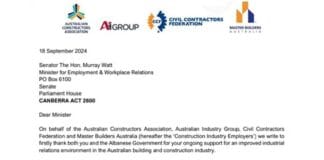NATIONAL: Firefighters at airports around Australia will start industrial action, including overtime bans, from 5 April.
The Aviation branch of the United Firefighters Union wants a pay rise based on the real cost of living and adequate staffing issues addressed.
UFU members are fighting the Australian Public Service Commission, which is implementing a “one-size-fits-all” public service pay deal for all public service employees at the behest of the Albanese government.
Other unions in the public service which object to this pay-capping by the commission include the AMWU, CFMEU and ETU.
AMWU members, trades staff employed at Federal Parliament House, have already taken strike action on 22 February, so the commission knows the UFU may strike, too.
Wes Garrett, secretary of the UFU’s Aviation branch, singled out regional airports such as Launceston and Sunshine Coast as being understaffed by firefighters.
AirServices Australia is sticking to the script of having offered “the maximum pay rise allowable under the APSC’s recent pay decision”. That maximum is 11.2 per cent over three years or 3.7 per cent a year, effectively an under-inflation pay cut.
Now air traffic controllers have taken initial steps towards organising their first strike in more than 20 years.
WESTERN AUSTRALIA: Pilots at Qantas subsidiaries, Network Aviation and QantasLink, and members of the Australian Federation of Air Pilots went on strike for three days in early March for a cost-of-living pay rise.
Their EBA expired in October 2020.
More than 95 per cent of pilots at Network Aviation are unionised and have rejected three of management’s below-par offers.
WESTERN AUSTRALIA: 18,000 public school teachers, members of the State School Teachers Union, have started work bans and work-to-rule, seeking a pay rise from the Cook Labor government following the expiry of their agreement in December 2023.
Premier Cook said Labor had removed the pay cap for state public sector workers but it failed to offer a deal over the summer.
The union wants a 12 per cent pay rise in a two-year agreement—7 per cent in the first year and 5 per cent in the second.
This is the common claim of all public sector unions in WA, who have united as the “Public Sector Alliance.”
In early March, the teachers’ union rejected an immediate 4.75 per cent pay rise, then 3 per cent for each of the next two years.
QUEENSLAND: About 7000 construction workers went on strike and marched on State Parliament on 15 February over state health and safety laws, winning a concession on heat policy.
This the second mass strike over this issue since September.
One construction worker told Solidarity, “Our protest was to get the Labor government to put our EBA heat policy into a code of practice to cover all construction workers—EBA and non-EBA alike. That is, to stop work at 35 degrees or at 29 degrees at 75 per cent humidity.
“It came about as a result of four heat stress-related deaths on non-EBA jobs over the Christmas period.
“The $6 billion CPB tunnel had one death and many others collapsing, with many ambulance trips to hospital.
“All the jobs in the CBD of Brisbane marched on State Parliament. We sent a delegation in to see the relevant Minister.
“As a result of our pressure on Labor, the government has agreed to implement the EBA heat-stress policy in a code of practice. It has already passed in Parliament and should be written-up as a code within the next six months, ready for next summer.
“I see it as a victory.”
QUEENSLAND: Fifteen electricians at the stevedore DP World, members of the ETU, held rolling strikes in March and placed work bans for a decent pay rise.
The sparkies’ actions began in December, with DP World refusing to resume negotiations until industrial action ended.
The skilled trades maintain and repair container handling equipment, including the automatic cranes.
Sparkies have rejected DP World’s offer of rises over four years of 6, 4, 4 and 4.5 per cent. They want a pay rise on a par with the company deal with the MUA, which was a four-year deal of 8, 7, 4 and 4.5 per cent.
VICTORIA: Academics and professional staff at Monash University, members of the NTEU, held a 24-hour strike from midday on 20 March for higher wages and better conditions, job security and the end of wage theft by their employer.
VICTORIA: More than 1000 regional rail workers went on strike for 13 hours on 8 March, the Friday before the Victorian long weekend, for a pay rise similar to Melbourne’s metro rail workers.
Operations staff, including conductors, train controllers, station and customer service staff and authorised officers, members of the RTBU, have been in dispute with V/Line since June last year.
The strike was an escalation on seven three-hour strikes since November.
Strikers have rejected V/Line’s offer of 4 per cent a year including bonuses and allowances, which is within the Allan Labor government’s pay cap of 3.5 per cent without additional payments.
The RTBU’s deal with Metro was barely better, at just 17 per cent over four years, or 4.25 per cent a year.
Workers are also demanding increased staffing levels and improved job security.
TASMANIA: Electricians at KONE and OTIS elevators went on a half-day strike on 1 March for pay parity with their counterparts in mainland states.
The sparkies install and maintain elevators for these two big companies. Their union, the ETU, said that matching mainland wages would mean a pay rise of 20 per cent.
The elevator companies can afford such a pay hike. KONE, a Finnish multinational, made a profit of 930 million euros in 2023, while OTIS, a US multinational, made a profit of $US1 billion in 2020.
The ETU members have also imposed a ban on after-hours call outs.
NATIONAL: More than 200,000 aged care workers have been granted a 28 per cent pay rise by the Fair Work Commission. But they won’t be getting it in one go or across the board, as mainstream headlines have suggested.
The Health Services Union and other unions first lodged a case in November 2020, with the FWC awarding an interim 15 per cent to direct care employees at the end of 2022. The HSU then pushed for an additional “work value” case.
This has meant another two-year wait for the rest of the pay rise to come through.
The rises for some workers start at 18 per cent and can go up to 28 per cent but for others it’s a rise of between 15 and 26 per cent, with only a 6.8 per cent increase for a third category of workers.
In addition, the FWC has yet to decide “the phasing-in schedule” of the pay rise.
Private aged care providers like the largest one, Catholic Health Australia, called on the federal government to fully fund the rise, so they don’t have to cut into their profits.
By Tom Orsag






